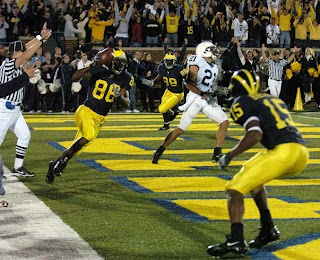
Every year, millions of fans get ready to cheer on their favorite football team. They throw parties, go to games, and spend hours tailgating. College and professional football are extremely popular; however, there are several differences in the two.
If you were to take the time to watch a college game, and then watch a professional game, it can be observed how different the games are played. One contrasting rule between college and the professional football is the clock. For college football, the clock stops whenever there is a first down allowing the measurement crew time to reset their chains. For professional games, the clock continues to run unless a player goes out of bounds.
Another difference is related to going out of bounds after a catch. In college, the rule requires a player to have control of the ball and get one foot down in-bounds for the catch to be considered complete. The professional side requires the player to have both feet in-bounds for it to be considered a fair catch.
In college football, a play is over when a player has a knee down with the ball. However, on the latter side, a player must be forced down. If a player falls, the NFL states a player can get back up and keep running.
Another important and probably the most discussed variation between college and professional football involves money. Professional football players get paid millions of dollars and it is argued that money is the only reason professional players play, whereas college players play for the love of the game. Is that true?
Derek U., freshman, commented, “Professional football is better than college because they have been playing their whole life. They get paid because they are the best of the best.”
However, college players do get scholarships, but in order for that free ride, they have to keep up their grades. Players also have to keep up going to practices, if players are unable to keep up with both they are penalized severely and can possibly lose their scholarship.
Brandon B., senior, said, “College football is better because they don’t get paid to play. They do it for the love of the game and for pride.”
Written by: Paige Amoss
If you were to take the time to watch a college game, and then watch a professional game, it can be observed how different the games are played. One contrasting rule between college and the professional football is the clock. For college football, the clock stops whenever there is a first down allowing the measurement crew time to reset their chains. For professional games, the clock continues to run unless a player goes out of bounds.
Another difference is related to going out of bounds after a catch. In college, the rule requires a player to have control of the ball and get one foot down in-bounds for the catch to be considered complete. The professional side requires the player to have both feet in-bounds for it to be considered a fair catch.
In college football, a play is over when a player has a knee down with the ball. However, on the latter side, a player must be forced down. If a player falls, the NFL states a player can get back up and keep running.
Another important and probably the most discussed variation between college and professional football involves money. Professional football players get paid millions of dollars and it is argued that money is the only reason professional players play, whereas college players play for the love of the game. Is that true?
Derek U., freshman, commented, “Professional football is better than college because they have been playing their whole life. They get paid because they are the best of the best.”
However, college players do get scholarships, but in order for that free ride, they have to keep up their grades. Players also have to keep up going to practices, if players are unable to keep up with both they are penalized severely and can possibly lose their scholarship.
Brandon B., senior, said, “College football is better because they don’t get paid to play. They do it for the love of the game and for pride.”
Written by: Paige Amoss

No comments:
Post a Comment